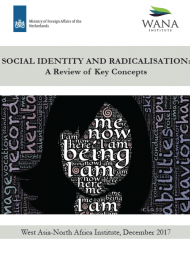-
Social Identity and Radicalisation: A Review of Key Concepts
Social Identity and Radicalisation: A Review of Key Concepts
Focus Area
Human Security
Author
Leen Aghabi, Kim Wilkinson, Dr Neven Bondokji, Alethea Osborne
Date
09 Jan 2018
The growth of violent extremist groups in the West Asia - North Africa (WANA) region has impelled academic and policy interest in radicalisation pathways and their drivers. But while radicalisation models usually incorporate identity-related factors, identity itself is rarely a central focus. To fill this gap, this literature review examines a specific area of social psychology – Social Identity Theory (SIT) – to explain how identity and related nuances of group membership, depersonalisation, and self-esteem, can operate to transform individuals into radicals.
This publication is generously supported with funds on behalf of the Ministry of Foreign Affairs of the Netherlands.

